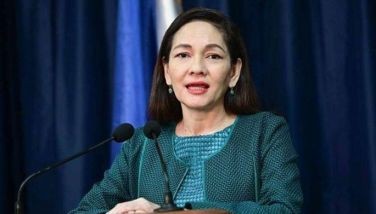Poe won’t keep Abaya if she becomes president
MANILA, Philippines - Sen. Grace Poe won’t be keeping Secretary Joseph Emilio Abaya at the Department of Transportation and Communications (DOTC) in case she wins the presidency next year.
“Let us just not name them because they still have a few months left under President Aquino,” Poe said yesterday when asked if she would retain Abaya and Social Welfare Secretary Corazon Soliman as members of the Cabinet if she becomes president.?Poe earlier said that the public deserves a better secretary when asked if Abaya should resign over the Metro Rail Transit 3 mess and the huge traffic problem in Metro Manila.
“You have seen the outcome of the investigations at the Senate, so you can see those who should not remain in office not just now but also in the coming administration,” Poe said.
“They are not even embarrassed that many of our countrymen suffer because of their inefficiency. Our countrymen deserve better services,” she said.
Speaking at a presidential forum last week, Poe said she would be happy to keep the best performing members of the Aquino Cabinet in her administration.
Poe chairs the Senate sub-committee on public services that conducted public hearings on the safety of the MRT 3 system and called for a review of the contracts being entered by the government to rehabilitate MRT 3.
Pro-tax reform
Meanwhile, Poe vowed that lowering income taxes would be among her priorities if she gets elected.
“I stand on a vision of genuine inclusive growth, and this is one of the most significant reforms a government can undertake to show its compassion for the millions of wage and salary workers who lose up to a third of their hard-earned income to unreasonably high taxes,” she said.
Under the Philippines’ current income tax bracket system, a Teacher 1 who makes roughly P18,000 per month pays over P14,000 in annual taxes if she is single and has no dependents.
The teacher can bring a higher take-home pay if the taxes are pegged at a lower rate, Poe noted.
The tax brackets in the Philippines have not changed since the Tax Reform Act was passed in 1997.
Sen. Juan Edgardo Angara, one of the principal authors of the income tax reform law, has noted that the brackets need to be adjusted due to inflation.
The 32-percent individual income tax rate in the Philippines for income over P500,000 is among the highest tax rates in Asia, lawmakers said.
Panganiban backs SET ruling
In a related development, retired chief justice Artemio Panganiban has supported the Senate Electoral Tribunal (SET) in upholding the eligibility of Poe for national election as a natural-born Filipino.
The former Supreme Court (SC) chief believes the majority SET ruling by five senators last Nov.17 was based on law and jurisprudence, disagreeing with criticisms that it was a political decision.
Panganiban, who was member of the SET when he was still an SC justice, said the ruling was based on the social justice principle upheld by the high court in the landmark ruling on the case of Frivaldo vs. Comelec in June 1996.
“If I were still a member, I would vote with the majority, consistent with the Frivaldo decision which I had the honor of writing for the Supreme Court, and with the overarching constitutionally enshrined social justice principle to give more law to those who have less in life,” Panganiban said in his column in another newspaper.
The ruling provided that “in case of doubt in the interpretation of constitutional and legal provisions involving popular sovereignty, it is best to interpret such provisions in a manner that enables our electorate to freely elect their chosen leaders.”
He pointed out that in the ruling, the SET established the undisputed facts that Poe has all the physical features (“only 5 ft. 2 inches tall, brown eyes and dark brown/black hair, low nasal bridge and oval-shaped face”) that give the presumption that her parents are Filipinos.
Also while the 1935 Constitution did not expressly mention the citizenship status of foundlings, framers of that Constitution, notably Manuel Roxas, considered children whose parents are unknown to be natural-born citizens of the place where they have been found by virtue of international law.
“The 1935 Constitution did not expressly mention the citizenship of foundlings. However, the Constitutional Convention delegates, notably Manuel Roxas, explained that the 1935 Constitution never intended to exclude foundlings from natural born citizenship and the only reason that there was no specific reference to foundlings was that foundlings are ‘few and far in between’ so that ‘it was not necessary to include a provision on the subject exhaustively.’” – With Edu Punay
- Latest
- Trending































